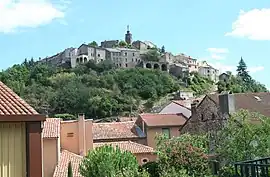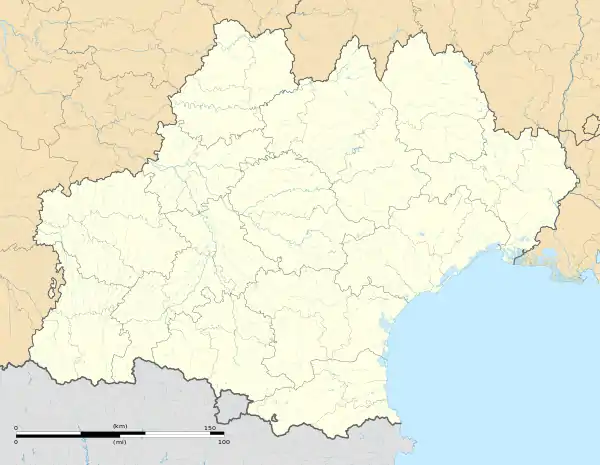Camarès | |
|---|---|
 A general view of Camarès | |
.svg.png.webp) Coat of arms | |
Location of Camarès | |
 Camarès  Camarès | |
| Coordinates: 43°49′24″N 2°52′49″E / 43.8233°N 2.8803°E | |
| Country | France |
| Region | Occitania |
| Department | Aveyron |
| Arrondissement | Millau |
| Canton | Causses-Rougiers |
| Government | |
| • Mayor (2020–2026) | Cyril Touzet[1] |
| Area 1 | 41.86 km2 (16.16 sq mi) |
| Population | 1,025 |
| • Density | 24/km2 (63/sq mi) |
| Time zone | UTC+01:00 (CET) |
| • Summer (DST) | UTC+02:00 (CEST) |
| INSEE/Postal code | 12044 /12360 |
| Elevation | 356–968 m (1,168–3,176 ft) (avg. 383 m or 1,257 ft) |
| 1 French Land Register data, which excludes lakes, ponds, glaciers > 1 km2 (0.386 sq mi or 247 acres) and river estuaries. | |
Camarès (French pronunciation: [kamaʁɛs]; Occitan: Lo Pont de Camarés) is a commune in the Aveyron department in southern France.
Geography
Situated 23 kilometres south of Saint-Affrique and 80 kilometres from Béziers, the commune is traversed by the Dourdou de Camarès and sits at the foot of the Monts de Lacaune.
Its red soil, le rougier, is a schistose sandstone. It covers a rich substrate which was exploited for the first mines of copper and argentiferous lead during the Gallo-Roman era.
The commune includes a thermal basin with springs that are no longer in use today: Prugnes les eaux, Andabre, Le Cayla et Sylvanès (eau thermale).
Population
| Year | Pop. | ±% |
|---|---|---|
| 1962 | 1,288 | — |
| 1968 | 1,253 | −2.7% |
| 1975 | 1,212 | −3.3% |
| 1982 | 1,258 | +3.8% |
| 1990 | 1,127 | −10.4% |
| 1999 | 1,008 | −10.6% |
| 2008 | 975 | −3.3% |
See also
References
- ↑ "Répertoire national des élus: les maires" (in French). data.gouv.fr, Plateforme ouverte des données publiques françaises. 13 September 2022.
- ↑ "Populations légales 2021". The National Institute of Statistics and Economic Studies. 28 December 2023.
Wikimedia Commons has media related to Camarès.
This article is issued from Wikipedia. The text is licensed under Creative Commons - Attribution - Sharealike. Additional terms may apply for the media files.